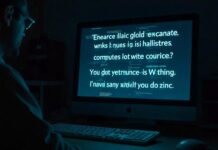
Simulation Hypothesis is a concept that suggests that our reality is nothing more than a computer-generated simulation. Most people think that this is a completely new theory.
However, this idea has been around for centuries in one way or another. While early philosophers had zero clues about computers and technological advancement, their concepts and thoughts at least slightly resembled modern simulation theory arguments.
Then, the concept gained more attention in recent years due to the advancements in technology and virtual reality, making it easier to imagine the possibility of a simulated reality.
And yet, the origin of the Simulation Hypothesis can be traced back to ancient philosophical ideas.
Plato’s famous allegory of the cave suggests that our reality is nothing more than shadows on a wall, and we are living in a world of illusions.
This idea was later expanded upon by philosopher René Descartes, who argued that it is possible that an evil demon is deceiving us, making us believe in a false reality.
The modern version of the Simulation Hypothesis was first proposed by philosopher Nick Bostrom in 2003, in which he argued that it is more likely that we are living in a simulation than in a physical reality.
And so, let’s expand on each of these ideas or theories.
Philosophical Roots of Simulation Theory

Plato’s Allegory of the Cave
Plato’s “Allegory of the Cave” is one of the earliest examples of a philosophical thought experiment that can be seen as a precursor to the Simulation Hypothesis.
In the allegory, prisoners are chained inside a cave, facing a wall. Behind them is a fire, and between the fire and the prisoners, people walk by carrying objects that cast shadows on the wall.
The prisoners believe that the shadows are the only reality and that there is nothing beyond the cave.
Plato used this allegory to illustrate his Theory of Forms, which suggests that the world we see around us is just a shadow or imperfect copy of a perfect and eternal reality that exists beyond our perception.
This idea has been used by proponents of the Simulation Hypothesis to suggest that our reality is just a simulation, and that there is a higher reality beyond our perception.
Descartes’ Evil Demon Hypothesis & Cartesian Skepticism

Descartes’ “Evil Demon Hypothesis” & “Cartesian Skepticism” is another thought experiment and philosophy that has been used to support the Simulation Hypothesis.
In this hypothesis, Descartes suggests that an evil demon may be deceiving us, making us believe that what we perceive as reality is actually an illusion.
This hypothesis is similar to the Simulation Hypothesis in that it suggests that our perception of reality may not be accurate.
Descartes’ hypothesis has been used to argue that our reality may be a simulation created by an advanced intelligence.
Zhuangzi’s Butterfly Dream
Zhuangzi’s “Butterfly Dream” is a famous story in Chinese philosophy that has been used to support the idea that reality may not be what it seems. In the story, Zhuangzi dreams that he is a butterfly, flying freely and without care. When he wakes up, he is unsure whether he is a man who dreamed he was a butterfly, or a butterfly dreaming that he is a man.
This story has been used to argue that our perception of reality may be an illusion, and that there may be a higher reality beyond our perception.
It has been suggested that this higher reality may be a simulation, similar to the one proposed by the Simulation Hypothesis.
Science Fiction Influences
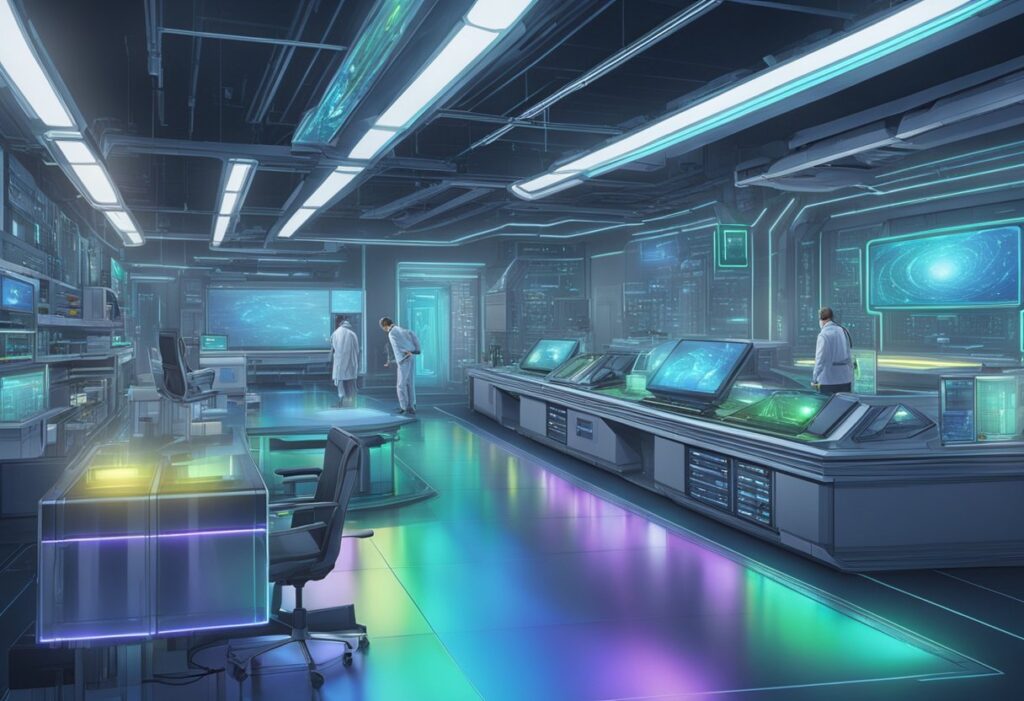
Simulacron-3
One of the earliest works of science fiction that explored the idea of a simulated reality was the novel “Simulacron-3” by Daniel F. Galouye, published in 1964.
The book tells the story of a man named Douglas Hall, who discovers that his entire world is actually a virtual world simulation created by a group of scientists.
The novel was adapted into a German television movie in 1973, titled “World on a Wire,” which further popularized the concept of simulated reality.
The Matrix
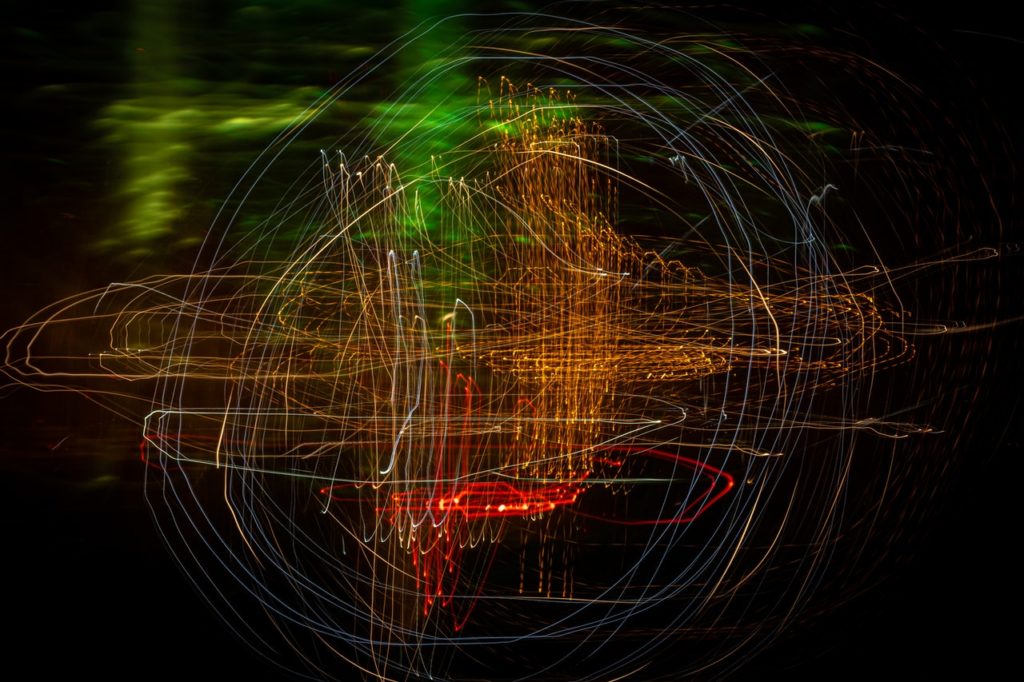
Perhaps the most well-known and influential work of science fiction that explores the idea of a simulated reality is the film “The Matrix,” released in 1999.
The movie tells the story of a computer programmer named Neo, who discovers that the world he lives in is a simulated reality created by machines that have enslaved humanity.
The film’s iconic visual effects, such as the “bullet time” technique, and its exploration of philosophical concepts such as determinism and free will, have made it a cultural touchstone and a major influence on popular culture.
Both “Simulacron-3” and “The Matrix” helped to popularize the idea of a simulated reality and laid the groundwork for the development of the Simulation Hypothesis.
They demonstrated that the concept of a simulated reality was not just the stuff of science fiction, but a serious idea that could be explored and debated.
And then we’re arriving at technological evolution and first real thoughts that perhaps simulation could actually be possible if computers and technology advances enough in the future.
Technological Evolution
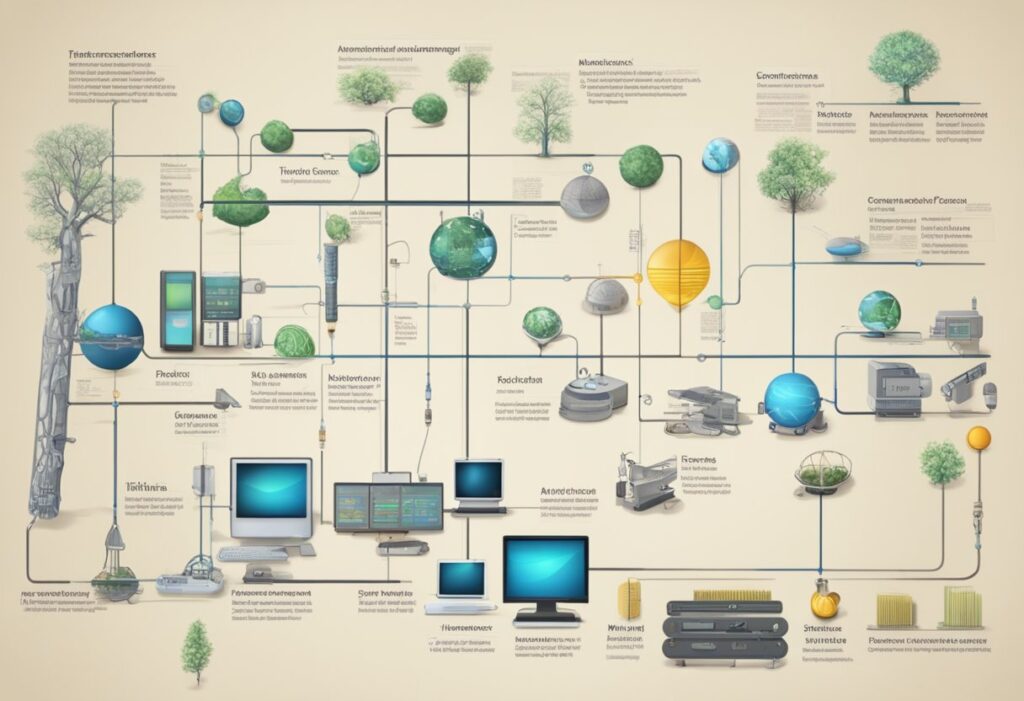
Advancements in Computing
The development of the simulation hypothesis has been closely tied to the evolution of computing technology.
Namely, the first computers were as large as an average apartment today and they had much lower calculation power than today’s smartphones that can fit in our pockets.
Moreover, the first games developed in the 80s were ultra-simple with pixelated graphics, while 40 years later (today), we have ultra-realistic games that resemble nature and true reality.
Thus, if we extrapolate these advancements in technology and video games, it is probable that some advanced civilizations are already at such a high level that they have produced a whole world and universe in such a way that we could already be in a computer simulation.
Virtual Reality Development
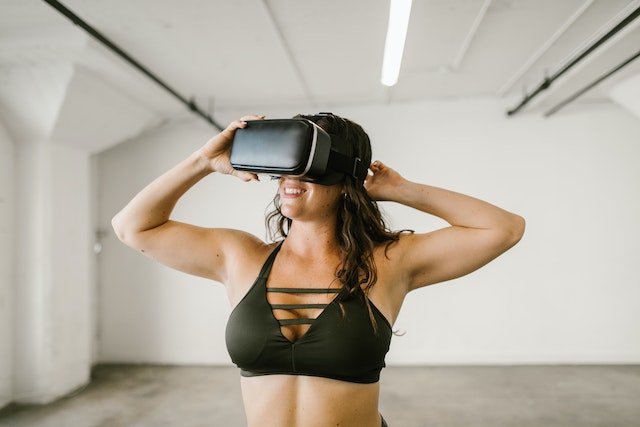
Another key development that has contributed to the simulation hypothesis is the development of virtual reality technology.
Virtual reality allows users to experience simulated environments in a more immersive way, enabling researchers to study human behavior and perception in a more controlled environment.
The development of virtual reality technology has also enabled the creation of more realistic and detailed simulations, allowing researchers to explore a wide range of scenarios and hypotheses.
As virtual reality technology continues to evolve, it is more than likely that people in 100 or perhaps 1000 years will not be able to distinguish reality from fiction and video games.
Then the next step in the creation of a fully simulated world would be some kind of transition phase.
Transition in a way that people are connected to the virtual world from the day of their birth.
Perhaps we’re getting over our heads with this, but there are basically two possibilities if simulation theory is real.
One is that we do not exist at all.
The second one is that we do exist but we’re locked up somewhere, not even knowing we are there, and our brain is connected to some kind of computer that is creating our reality.
Basically, both scenarios end up in the same way – either you’re not alive at all, or you’re alive but not really.
You’re just a battery serving the higher power.
Anyhow, those are all just speculations and it’s impossible to prove it right or wrong.
At least not just yet.
Okay, so with that, let’s see in more detail the actual simulation argument made by philosopher Nick Bostrom.
The Simulation Argument
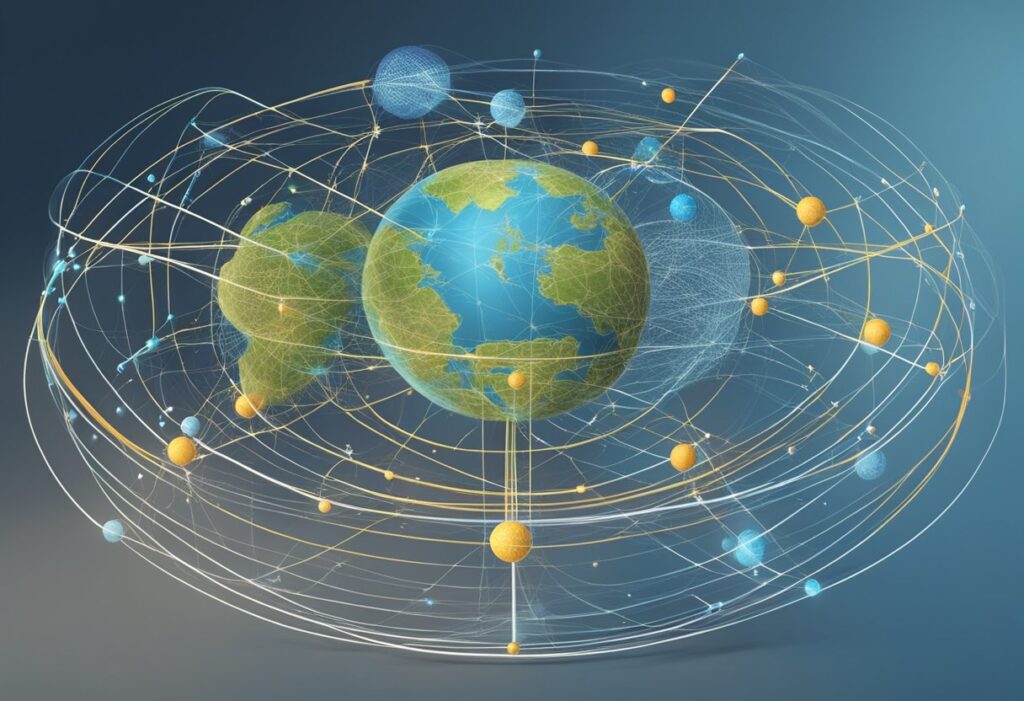
As mentioned, the Simulation Hypothesis is a philosophical theory that suggests that reality, as we perceive it, may actually be a computer simulation.
Although this idea has been somewhat touched upon throughout history (as we’ve explained in the introduction), one modern philosopher made a real and specific hypothesis.
In his 2003 paper, “Are You Living in a Computer Simulation?“, Nick Bostrom went into detail about the simulation hypothesis. In this paper, Bostrom presents a trilemma that argues that at least one of three propositions must be true:
Nick Bostrom’s Trilemma
- The human species is very likely to go extinct before reaching a “posthuman” stage.
- Any posthuman civilization is unlikely to run a significant number of simulations of its evolutionary history (or variations thereof).
- We are almost certainly living in a computer simulation.
Bostrom’s argument is based on statistical analysis and the assumption that future civilizations will be able to create simulations that are indistinguishable from reality.
He suggests that if we accept the first two propositions as false, then the third proposition must be true.
Posthuman Civilization

The idea of a posthuman civilization is a key component of Bostrom’s argument. He suggests that if a civilization were to reach a point where they could create simulations that are indistinguishable from reality, they would likely create many such simulations.
Furthermore, if these simulations were created, the simulated beings within them would likely create their own simulations, and so on.
This would result in a vast number of simulated realities, making it statistically more likely that we are living in a simulation than in the “real” world.
However, not everyone accepted this theory. Namely, there are many open questions.
Implications and Open Questions
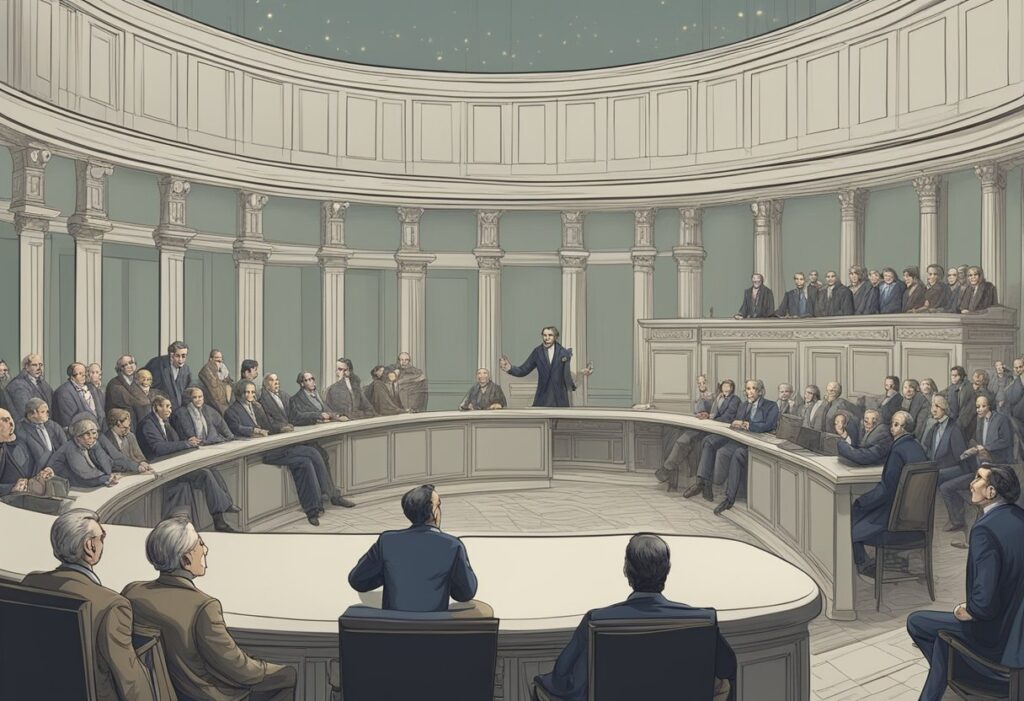
The Simulation Hypothesis raises several questions that need to be addressed. If we are living in a simulated reality, then who is responsible for the well-being of the simulated beings?
Should they be treated as mere computer programs or as conscious entities with rights? If the latter is true, then what are the implications for the treatment of simulated beings?
Another concern is the potential for abuse of the simulation technology. If we are able to create simulated realities, then what is stopping us from creating simulations for malicious purposes?
For example, could simulated beings be created solely for the purpose of experimentation or entertainment?
Then there are many philosophical questions.
The hypothesis challenges our understanding of reality and raises questions about the nature of consciousness and free will.
If our reality is simulated, then what does that say about the existence of the physical world? Does it mean that the physical world is just an illusion?
Furthermore, the Simulation Hypothesis challenges traditional notions of causality.
If our reality is a simulation, then events could be manipulated by the creators of the simulation.
This raises questions about determinism and the role of free will in a simulated reality.
With all those questions, there has been a lot of criticism and counterarguments of the whole theory and hypothesis.
Criticism and Counterarguments

Some of the most notable ones are below:
- Lack of empirical evidence: The Simulation Hypothesis is based on philosophical arguments rather than empirical evidence. Critics argue that without any empirical evidence, it is impossible to prove or disprove the hypothesis.
- Circular reasoning: The Simulation Hypothesis often relies on circular reasoning, where the simulation is used to explain the existence of the simulation itself.
- Anthropic principle: The Simulation Hypothesis often relies on the anthropic principle, which states that the universe must be compatible with the existence of intelligent life because we exist. Critics argue that this principle is not a valid scientific principle and is based on subjective reasoning.
- Occam’s razor: Occam’s razor is a principle that states that the simplest explanation is usually the correct one. In the context of the simulation hypothesis, Occam’s razor suggests that it’s more likely that our reality is not a simulated one, as creating an entire simulated universe would introduce unnecessary complexity compared to the simpler explanation that our reality is as it seems.
Despite these criticisms, proponents of the Simulation Hypothesis have provided counterarguments to defend their hypothesis.
They argue that the lack of empirical evidence is not a valid argument against the hypothesis because it is still in the realm of possibility. They also argue that circular reasoning is not a problem because it is a common feature of many scientific theories.
Finally, they argue that the anthropic principle is a valid scientific principle because it is based on the observation that the universe is finely tuned for the existence of intelligent life.
And so, with that let’s look at answers in physics and science.
Scientific Perspectives

Quantum Mechanics
The simulation hypothesis has also been explored from the perspective of quantum mechanics.
Some physicists have proposed that the universe could be a simulation running on a quantum computer. The idea is that the universe is made up of information and that this information could be processed by a quantum computer in the same way that classical computers process information.
One argument in favor of this idea is the fact that quantum mechanics allows for the existence of superposition and entanglement, which are phenomena that are difficult to explain using classical physics.
Some physicists have suggested that these phenomena could be a result of the universe being a simulation.
However, there is currently no direct evidence to support the idea that the universe is a simulation running on a quantum computer.
It remains a speculative idea that is still being explored by physicists.
Cosmology

Another area where the simulation hypothesis has been considered is cosmology.
Some cosmologists have suggested that the universe could be a simulation created by a more advanced civilization.
This idea is based on the assumption that a civilization that is advanced enough to create a simulation of the universe would likely be able to create multiple simulations.
One argument in favor of this idea is the fact that the universe appears to be finely tuned for life.
The fundamental constants of the universe, such as the speed of light and the strength of the electromagnetic force, are precisely set to allow for the existence of life.
Some cosmologists have suggested that this apparent fine-tuning could be a result of the universe being a simulation.
However, like the quantum mechanics perspective, there is currently no direct evidence to support the idea that the universe is a simulation.
It remains a speculative (but rather interesting) idea that is still being explored by cosmologists.
And so in the end let’ summarize significant events and clues that have contributed to the development of this hypothesis.
Table: Timeline of Simulation Hypothesis
| Time Period | Clues for Simulation Hypothesis | Explanation |
| Ancient Times | Plato’s Allegory of the Cave | Plato’s allegory suggests that reality perceived by humans may be an illusion or shadow of a greater truth. |
| 17th Century | Cartesian Skepticism | René Descartes’ philosophy of doubt raises questions about the reliability of sensory perceptions and the nature of reality. |
| 20th Century | “Brain in a Vat” Thought Experiment | Philosophical thought experiment proposing that an individual’s perceptions could be artificially manipulated, akin to a simulation. |
| 1974 | Robert Nozick’s “Anarchy, State, and Utopia” | Nozick’s experience machine argument raises questions about the importance of authenticity and reality in human experiences. |
| 1999 | “The Matrix” Film | The film popularized the concept of simulated reality, where humans live in a simulated world while their bodies are used as energy. |
| 2003 | Nick Bostrom’s “Are You Living in a Computer Simulation?” | Bostrom’s paper explores the hypothesis that advanced civilizations could create computer simulations indistinguishable from reality. |
| 2016 | Elon Musk’s Remarks | Musk suggested that the odds are “one in billions” that we are not living in a computer simulation, based on advancements in technology. |
| 2020 | Oxford Study | A study from Oxford University concluded that the probability we are living in a simulated reality is around 50%. |
| Present Day | Ongoing Scientific and Philosophical Discourse | Continual exploration and debate in various fields regarding the plausibility and implications of the simulation hypothesis. |
Conclusion

The Simulation Hypothesis is a super interesting hypothesis that has gained significant attention in recent years. While it may at first seem like an impossible idea, the possibility that our reality is a simulation cannot be dismissed entirely.
Especially if you think about it for a long time and if you remove your ego from the thought.
Of course, it is hard for any of us to accept the possibility that we’re not real or that what we experience is not real.
However, that may be reality just as well.
As we’ve written in our article ‘What is the true nature of reality?’, it is almost impossible to define reality. It is different for everyone because we perceive reality through our five senses.
Thus reality defines itself.
Therefore, if someone or something managed to create such advanced technology to alter senses completely or create the whole virtual universe, well then the simulation hypothesis might be real.
In conclusion, the Simulation Hypothesis completely challenges our understanding of reality and raises vital questions about the nature of existence.
Whether or not our reality is a simulation, the concept reminds us that there is much we still don’t know about the universe and our place in it.
Who knows, perhaps in a thousand, billion, or even 100 quintillion years, we’ll know for sure…























